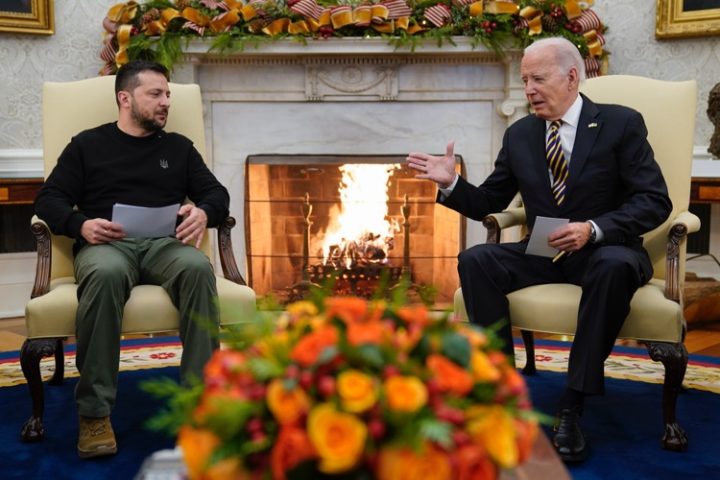
During a White House reception marking the Jewish holiday of Hanukkah on December 11, President Joe Biden voiced his “unshakable” commitment to Israel’s security and vowed continued military support for Israel amid its war with the Gaza-based Palestinian terrorist group, Hamas.
The United States remains Israel’s most crucial ally amid the ongoing conflict, which has ignited widespread denunciation in the Muslim world and beyond due to Israeli bombings on Gaza. The strikes have resulted in massive civilian casualties, as per reports by local medical authorities.
Moreover, Biden slammed what he called a “sickening” rise of anti-Semitism both in the United States and around the world amid the war. “We see it across our communities and schools and colleges and social media,” he said, elaborating that “silence is complicity.”
Addressing his audience comprising Jewish lawmakers and other attendees, Biden said that his “commitment to the safety of the Jewish people and the security of Israel, its right to exist as an independent Jewish state, is unshakeable.”
Aso, he pledged “continue to provide military assistance to Israel until they get rid of Hamas,” adding, nonetheless, that both the United States and Israel had to be careful not to antagonize “the world’s public opinion.”
Over the weekend, the Biden administration bypassed congressional authority over military aid to Israel and authorized emergency approval for the sale of $106.5 million worth of tank ammunition to Israel. The move came as the White House grappled with obtaining congressional approval for $106 billion in supplemental security spending, including $14.3 billion for Israel.
Biden continued, stating that he felt an “unquestionable” connection to the Jewish community. “I ran into trouble and criticism when I said a few years ago that you don’t have to be Jewish to be a Zionist, and I am a Zionist,” he declared to his audience of some 800 people.
Last week, the United States was the only member of the UN Security Council to veto an emergency resolution urging for an emergency ceasefire in Gaza. On December 8, UN Secretary-General António Guterres said “there is a serious risk of starvation and famine,” pointing out that 97 percent of households in northern Gaza and 83 percent of displaced people in the south “are not eating enough.”
Israel conducted a military operation in Gaza in response to a surprise brutal attack by Hamas on October 7 that claimed the lives of around 1,200 Israelis, mostly civilians. Over 240 people were also taken hostage by the militants.
The Israel Defense Forces (IDF) retaliated with widespread bombings of the Palestinian enclave, as well as a ground operation. The death toll in the enclave associated with Israeli actions has exceeded 18,400, based on recent estimates by the Gaza Health Ministry.
Additionally, Biden promised another $200 million in emergency military aid for Ukraine during an Oval Office meeting with Ukrainian authoritarian leader Volodymyr Zelensky on December 12.
The Biden-Zelensky meeting came after the U.S. Senate blocked a bill meant to supply $60 billion in aid for the Kyiv regime last week, as Republicans insisted on more stringent immigration control on the U.S. southern border in exchange for authorizing Ukraine assistance.
Speaking to reporters after the December 12 meeting, Biden demanded that Congress “pass the supplemental funding for Ukraine” before breaking for recess, adding that not doing so would be “the greatest Christmas gift” to Russian President Vladimir Putin.
“The decisions we make now are going to determine the future for decades to come, particularly in Europe,” Biden said.
The latest $200 million in aid declared by Biden will hail from the Presidential Drawdown Authority (PDA), which permits the Biden administration to send weapons from U.S. stocks without congressional approval in the event of an emergency.
The package will entail ammunition for the High Mobility Artillery Rocket Systems (HIMARS), high-speed anti-radiation missiles, anti-armor systems, artillery rounds, missiles, demolition munitions, four million rounds of small arms ammunition, generators, and other equipment and spare parts, the Associated Press reported, quoting U.S. officials.
Earlier in the day, Zelensky met with lawmakers on Capitol Hill to request more aid amid Kyiv’s ongoing crisis with Russia. The Ukrainian leader met with House Speaker Mike Johnson, as well as a number of other senators. Posting on X, Zelensky said he had a “friendly and candid conversation” with senate leaders.
Republican leader Mitch McConnell told reporters on December 12 that it would be “practically impossible” for Congress to pass the supplemental funding package, which includes the delayed $60 billion for Kiev, before Christmas, saying it needed to be done as part of a broader package that includes amendments to border security policy.
On December 11, Ohio Senator J.D. Vance lambasted Zelensky’s trip as “utterly disgraceful,” castigating the Ukrainian leader for visiting the US, “lecturing” Americans and “demanding” more of their taxpayer dollars.
Zelensky’s requests to sustain the flow of economic and military aid came amid a six-month counteroffensive against Russia which has failed to yield considerable gains. Kyiv’s troops have lost more than 125,000 military personnel and 6,000 pieces of heavy equipment since the beginning of June, as per figures provided by the Russian Defense Ministry.
Moscow has repeatedly cautioned that the continued supply of Western aid and weapons will only prolong the conflict.
Various senators and representatives, including House Speaker Mike Johnson, told the media following the Zelensky-Biden meeting on December 12 that Zelensky has failed to provide any new arguments justifying his cause during his talks in Washington with American lawmakers.
Last week, GOP senators blocked the Biden administration’s major $111-billion supplemental funding request, which included aid for Ukraine, Israel, and Taiwan, citing the Democrats’ hesitancy to tackle the tense situation on the U.S.-Mexico border.
Some Republicans have also repeatedly singled out the lack of accountability in terms of the funds Washington had spent on helping Ukraine.
According to senior GOP senator Lindsey Graham, the Zelensky-Biden meeting on December 12 did not lead to any changes in the lawmakers’ stance. “Nothing has changed,” he told journalists. The South Carolina senator, who emerged as a vocal advocate for Kyiv amid its conflict with Moscow, explained that, although he would like to help Ukraine, border security came first.
“I admire him, but he didn’t change my mind at all about what we need to do,” Graham said, alluding to Zelensky and adding that the Democrats were supposedly trying to “use” the Ukrainian leader “in a way that I think wasn’t helpful.” “I want to secure the border,” the senator said, adding that the number of people reportedly connected to various terrorist groups that were crossing America’s southern border was “just chilling.”
Another Republican senator, Missouri’s Eric Schmitt, also said that the meeting was effectively reduced to “the same old stuff.” “There’s nothing new,” he told journalists, adding that the questions for the Ukrainian president “were very scripted.”
Speaker Johnson, who also met Zelensky on Tuesday, pointed to the fact that the White House and Kiev were asking for billions of dollars with no oversight and no clear strategy that would allow Ukraine to prevail in the ongoing conflict.
“Their responses have been insufficient,” Johnson said, referencing the Biden administration and adding that he had been requesting details on Washington’s strategy for Ukraine “over and over since literally 24 hours after I was handed the gavel as Speaker of the House.”
Lindsey Graham also told journalists that he had told Zelensky to be thankful to the House speaker for even being willing to place military aid for Ukraine on the agenda. “I said you need to thank Mike Johnson for being willing to pass a package if border security is in it, because half his conference probably doesn’t agree with that,” the senator said.
The United States has already supplied Kyiv with $111 billion in military and economic assistance since military tensions between Moscow and Kyiv escalated in February 2022. Washington has recently warned that funds for the Kyiv government have almost run out.
Last week, U.S. National Security Council spokesman John Kirby said that Kiev cannot expect more funding until Congress resolves its gridlock. Zelensky’s chief of staff, Andrey Yermak, then warned that delays in U.S. aid could cause Ukraine’s defeat by Russia.



